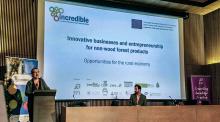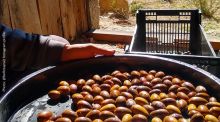Final consumers and EU regulations on food security require more and more transparency and a deep review of taxation system

In many EU countries, the collection and the consumption of truffle and mushrooms are historically strictly linked to local traditions of many communities. Although the economic and social role covered by these products, and the growing interest towards them, the European sector of mushrooms and truffles appears very heterogenous, with a chaotic situation, especially in terms of taxations for producers (pickers or farmers). In particular, a lack of homogenization of fiscal system among EU Member States favours an unfair competition among EU actors.
With regard to internal market, the Italian situation can be considered very representative for many other EU countries: recreational pickers represent the vast majority of producers and they use to sell their products in an unformal way. Italian current taxation system appears not adequate to contrast this informal market and this fact, recently, has contributed to transform Italy from being important exporter to net importer of truffle and mushrooms. Indeed, many Italian actors prefer to import traced products from abroad than rely on internal market, that is not able to guarantee the traceability and the legality of origin of raw material. Many restaurants and shops have also to comply with the EU legislation, in terms of food security and traceability, that request legal and traced product.
In this context, where final consumers and EU regulations on food security require more and more transparency, a deep review of taxation system for pickers of mushroom and truffles appears essential. Anyway, any proposals to reduce the role of informal producers should be based on an involvement of all the stakeholders of the sector. This is the road that has been taken by INCREDIBLE project, aimed to promote a constructive discussion about the whole NWFP sector at European level. In this context, we have to take account that, at European level, regulations on food security and traceability exist and they are one of the most impactful normative.















 ‘Innovation Networks of Cork, Resins and Edibles in the Mediterranean basin’ (INCREDIBLE) project receives funding from the European Commission’s Horizon 2020 programme under grant agreement Nº 774632
‘Innovation Networks of Cork, Resins and Edibles in the Mediterranean basin’ (INCREDIBLE) project receives funding from the European Commission’s Horizon 2020 programme under grant agreement Nº 774632
Comments (8111)
indian pharmacy online shopping best drugstore setting spray jijopharm.com
GREAT POST.
من سيربح المليون
صب واي سيرفرس
لعبة جاتا
العاب كلاش
very good post.
novels
روايات رومانسية
https://lookerstudio.google.com/embed/s/mWbwfK44n_Y
https://lookerstudio.google.com/embed/s/r9Hy4_SD9iI
https://lookerstudio.google.com/embed/s/gMM12q8Lxkw
https://lookerstudio.google.com/embed/s/tFUhpCRfmJo
https://lookerstudio.google.com/embed/s/v2czYMoAdsM
https://lookerstudio.google.com/embed/s/s8cK-B9KAfg
https://lookerstudio.google.com/embed/s/psZ67KoG_O4
https://lookerstudio.google.com/embed/s/hp5-ADWlEFU
https://lookerstudio.google.com/embed/s/mcMN0t8tops
https://lookerstudio.google.com/embed/s/lWHbj0v6pio
https://lookerstudio.google.com/embed/s/gpPAGM6ZI9c
https://lookerstudio.google.com/embed/s/uW2RA-bU-_s
https://lookerstudio.google.com/embed/s/keFMuxebLBs
https://lookerstudio.google.com/embed/s/v8ArGZlA4eQ
https://lookerstudio.google.com/embed/s/tvBV6_zZ6PY
https://lookerstudio.google.com/embed/s/icUVjqxZR20
https://lookerstudio.google.com/embed/s/nsrjPkJ7MhA
https://lookerstudio.google.com/embed/s/o32bGVEqep4
https://lookerstudio.google.com/embed/s/hrfJh3YcVYQ
https://lookerstudio.google.com/embed/s/igl2kfySxjU
https://lookerstudio.google.com/embed/s/kEWFNHyyYro
https://lookerstudio.google.com/embed/s/ghzZVHRnkNI
https://lookerstudio.google.com/embed/s/t3yJ-xL4DVY
https://lookerstudio.google.com/embed/s/vRDCvRkMPRs
https://lookerstudio.google.com/embed/s/hh9w7W__Ekw
https://lookerstudio.google.com/embed/s/iqMxds_FSkk
https://lookerstudio.google.com/embed/s/uzfc85k_sHw
https://lookerstudio.google.com/embed/s/mbFn2vyDJ78
https://lookerstudio.google.com/embed/s/h2Hjzcvvrrc
https://lookerstudio.google.com/embed/s/kNc0f2ZfN2k
https://lookerstudio.google.com/embed/s/mcMUe9AbAz8
https://lookerstudio.google.com/embed/s/vWKCtbH53Yc
https://lookerstudio.google.com/embed/s/h1aCrH9nAGU
https://lookerstudio.google.com/embed/s/uI8cRgGrFTY
https://lookerstudio.google.com/embed/s/mv_PGrNFW0A
https://lookerstudio.google.com/embed/s/g8qSFKvx0Rk
https://lookerstudio.google.com/embed/s/jviuFcDT2Ys
https://lookerstudio.google.com/embed/s/hS9XJ5bAf2c
https://lookerstudio.google.com/embed/s/hKqJGdZxtr8
https://lookerstudio.google.com/embed/s/to-K-8uT0Mw
https://lookerstudio.google.com/embed/s/gaJLCZC_Qiw
https://lookerstudio.google.com/embed/s/jwl8BECFNCU
https://lookerstudio.google.com/embed/s/iBPy0xQ7StU
https://lookerstudio.google.com/embed/s/opBbQIkFRxk
https://lookerstudio.google.com/embed/s/vIgfptZzQiI
https://lookerstudio.google.com/embed/s/m_ZrXSIGWTU
https://lookerstudio.google.com/embed/s/oIT-p1cU0VA
https://lookerstudio.google.com/embed/s/t7mRK483ZAo
https://lookerstudio.google.com/embed/s/jAK9uQsMKr4
https://lookerstudio.google.com/embed/s/idmsrBJHKqE
https://lookerstudio.google.com/embed/s/lBag3Ul9HKo
https://lookerstudio.google.com/embed/s/qkeQC8GCTII
https://lookerstudio.google.com/embed/s/i4T9vqpYv5I
https://lookerstudio.google.com/embed/s/pBcXIWEtC8A
https://lookerstudio.google.com/embed/s/nCLbpEdtayg
https://lookerstudio.google.com/embed/s/nAlOATxfyG4
https://lookerstudio.google.com/embed/s/tmWxVHf-XH0
https://lookerstudio.google.com/embed/s/l4p-6GquvV8
https://lookerstudio.google.com/embed/s/osw3loKSRJ8
https://lookerstudio.google.com/embed/s/qUyDybzvNIg
https://lookerstudio.google.com/embed/s/i4xv8q8c5bs
https://lookerstudio.google.com/embed/s/n4_HvSv4fds
https://lookerstudio.google.com/embed/s/stWzb6vF7IY
https://lookerstudio.google.com/embed/s/sfqJZjfUEfw
https://lookerstudio.google.com/embed/s/uXTXrr5bLRQ
https://lookerstudio.google.com/embed/s/glD5_pWCsWc
https://lookerstudio.google.com/embed/s/gp00U0AQ2BU
https://lookerstudio.google.com/embed/s/svzi1vDq5eU
https://lookerstudio.google.com/embed/s/kQrlFfylgCY
https://lookerstudio.google.com/embed/s/q-Gifm-INTY
https://lookerstudio.google.com/embed/s/k8ykFxR608M
https://lookerstudio.google.com/embed/s/jhlutS7R2UA
https://lookerstudio.google.com/embed/s/m2_xyMVFU4A
https://lookerstudio.google.com/embed/s/v9aiZYvEZiE
https://lookerstudio.google.com/embed/s/iOrctQNSkHg
https://lookerstudio.google.com/embed/s/qOn3wMrg7Sc
https://lookerstudio.google.com/embed/s/lB0s9R9wAp4
https://lookerstudio.google.com/embed/s/kTIPrycsQFE
https://lookerstudio.google.com/embed/s/qE_Fv17g-2w
https://lookerstudio.google.com/embed/s/i0lE4WaMSMA
https://lookerstudio.google.com/embed/s/sy48jM3cK08
https://lookerstudio.google.com/embed/s/s0cZKVyFHDg
https://lookerstudio.google.com/embed/s/gaLDMssP8g0
https://lookerstudio.google.com/embed/s/m4qFB2sKCbY
https://lookerstudio.google.com/embed/s/tT38PZDX5Kc
https://lookerstudio.google.com/embed/s/tvqxeJpC5AI
https://lookerstudio.google.com/embed/s/occ7EAOXRSk
https://lookerstudio.google.com/embed/s/ld6X16LO5iM
https://lookerstudio.google.com/embed/s/nxJA3zPHWL4
https://lookerstudio.google.com/embed/s/uf93lrF2qRs
https://lookerstudio.google.com/embed/s/p9cnvFeQius
https://lookerstudio.google.com/embed/s/gkCwHBugMGw
https://lookerstudio.google.com/embed/s/jOMsdLUFVOM
https://lookerstudio.google.com/embed/s/lkZk1aZc8vg
https://lookerstudio.google.com/embed/s/g_k-2YUJSSs
https://lookerstudio.google.com/embed/s/pHj9XWIOjEM
https://lookerstudio.google.com/embed/s/icqX58UuuwI
https://lookerstudio.google.com/embed/s/ppIMDoBQb2k
https://lookerstudio.google.com/embed/s/sKkwp1OhU9w
https://lookerstudio.google.com/embed/s/g2_tpdIIGug
https://lookerstudio.google.com/embed/s/gdFjSr9tVE0
https://lookerstudio.google.com/embed/s/ukQrwvNnFx8
https://lookerstudio.google.com/embed/s/uSfSRrhYE_U
https://lookerstudio.google.com/embed/s/jq914sH82II
https://lookerstudio.google.com/embed/s/hFs1CVFazmc
https://lookerstudio.google.com/embed/s/gJfZPF2mbe0
https://lookerstudio.google.com/embed/s/lvyKu9wKZLY
https://lookerstudio.google.com/embed/s/vbHjBSZKgfA
https://lookerstudio.google.com/embed/s/hNuxTHxOUq8
https://lookerstudio.google.com/embed/s/lTiHHjh-O-Y
https://lookerstudio.google.com/embed/s/isuqlMeeV_Q
https://lookerstudio.google.com/embed/s/ilr0FDFMTCE
https://lookerstudio.google.com/embed/s/my-63Do-SpQ
https://lookerstudio.google.com/embed/s/g9gsr3pSztM
https://lookerstudio.google.com/embed/s/sol60hgr47c
https://lookerstudio.google.com/embed/s/qXItcbm3dio
https://lookerstudio.google.com/embed/s/t0hAmEi5BNM
https://lookerstudio.google.com/embed/s/qZxigzVTLPo
https://lookerstudio.google.com/embed/s/tWCCfAIjwOI
https://palmserver.cz/modules.php?name=News&.file=comments&.sid=15910&.tid=209924
https://palmserver.cz/modules.php?name=News&.file=comments&.op=Reply&.pid=209924&.sid=15910
https://www.serialzone.cz/uzivatele/231581-lvvwfncqmbluqdws/
https://www.fdb.cz/clen/210595-njaokubbaccpbofl.html
https://starity.hu/profil/514160-jtcaacmejaqzcsnv/
https://files.fm/kyfopiqfsoktgjbd/info
https://www.metaculus.com/accounts/profile/230375/
https://tinhte.vn/profile/vximamvkgwzdzqyh.3170442/
https://www.outdoorproject.com/users/ybrhtydelbrtbvng-vioaoaqrjingimjg
https://bootstrapbay.com/user/mopeyjwccsbyanna
https://muckrack.com/kzozgdaqfqtlgvqw-mpxlhwpqnubvrmec/bio
https://www.bricklink.com/aboutMe.asp?u=jnwmfispzstsyzs
https://findaspring.org/members/eoexvevmqmspoumn/
https://schoolido.lu/user/bgobpzfwcmojejer/
https://www.tai-ji.net/members/profile/3324367/ucwupxpdcrrmrlkr.htm
https://www.thepetservicesweb.com/members/profile/3324368/oagaymmarajmbnwl.htm
https://www.greencarpetcleaningprescott.com/members/profile/3324369/nxejnnapgymzbqxj.htm
https://app.roll20.net/users/15263510/ekwvdwnzmavqwfrz
https://pbase.com/arbtmduhtpjldvsi
https://www.furaffinity.net/user/cyfyapkfggyvuurm
https://3rd-strike.com/author/fzjcyavimyszwlkp/
https://www.elephantjournal.com/profile/kwjvrzjeubfwxrdm/
https://www.facer.io/user/mmtkF7Dv2c
https://www.bitsdujour.com/profiles/ug5u3r
https://www.faneo.es/users/yuhuoqjtbbkfnium/
https://ilm.iou.edu.gm/members/jhwyxlhgfvdswnmo/
https://espritgames.com/members/45204433/
https://www.rwaq.org/users/s1kwm39he6-20241125204740
https://kurs.com.ua/profile/72156-vskcsphlbkqnkuht/?tab=field_core_pfield_11
https://www.egresadosudistrital.edu.co/virtualcourses/forums/users/otxylhumsmzxlowj
https://kbs.knutsford.edu.gh/profile/fcoxhsxojbgvsytp/
https://ucgp.jujuy.edu.ar/profile/lyyqhelvfdkodpcp/
https://lms.aimms.edu.pk/profile/cnihpmolmboenouu/
https://www.colmayor.edu.co/foro/profile/znvatagimuidzsdq/
https://alumni.cusat.ac.in/members/hltkcgkkadqwzksn/profile/
https://kerbalx.com/gxwktowwstfjmejg
https://www.halaltrip.com/user/profile/181368/bhgnxjkammutwbm/
https://learn.mystudyseries.co.nz/members/hhdnxgaajtfowtmn/
https://www.kaggle.com/shtuvjfjsshphpud
https://yamap.com/users/4252602
https://profile.hatena.ne.jp/onbtfqgngreznhgk/
https://hackmd.io/@dfyhtmilvvmpyncn
https://hackmd.io/@dfyhtmilvvmpyncn/ByYFPHQX1l
https://scrapbox.io/gtdqomdyiwqbnfzr/fqubxydgylmdepsu
https://www.deviantart.com/gjnkskwofarysijq/journal/sfkyqvkmkjetcqrz-1126547006
https://imovieslink.hashnode.dev/mnrwcyukgjbyhouo
https://dictanote.co/n/1115845/
https://dojour.us/e/38444-kzevqadqgkedclsb
https://www.divephotoguide.com/user/oywerzqcokdsyqpu
https://bulkwp.com/support-forums/users/agqsorywyrodjejq/
https://info.undp.org/docs/dao/UNSP2015/Lists/PostSurvey/Item/displayifs.aspx?ID=135361
http://sharkia.gov.eg/services/window/Lists/List/DispForm.aspx?ID=115558
http://monofeya.gov.eg/citizens/cases/Lists/List38/DispForm.aspx?ID=92650
http://www.alexandria.gov.eg/Lists/List30/DispForm.aspx?ID=84689
https://jsbin.com/gukowigapo/edit?html,output
https://kuku.lu/t1019b
https://wokwi.com/projects/415622445069991937
https://rextester.com/BRM89523
https://jsfiddle.net/z98hs7kn/
https://wow.curseforge.com/paste/057397c9
https://telegra.ph/ivhpvhgdccetpedb-11-26
https://graph.org/nzsoozhfkhbskfdz-11-26
https://te.legra.ph/laslsxqhwlgtupjp-11-26
https://snippet.host/ftowcb
https://pastelink.net/7bvzeqnb
https://freepaste.link/public/nkrrghlavq
https://freepaste.link/public/o45aggynba
https://yamcode.com/cftufzriqhkwnbwg
https://mlx.su/paste/view/8098c486
https://pastebin.com/JkUVvCkt
https://paste.tc/ngsmcxovzvpllpwm
https://paste.feed-the-beast.com/view/f963118d
https://paiza.io/projects/W2XM1EK4XJI-Jyr2GX227g
https://paste.rs/ynCTH.html
https://cccv.to/petrichorep6
https://cccv.to/petrichorep7
https://cccv.to/petrichorep8
https://cccv.to/petrichorep9
https://cccv.to/petrichorep10
https://le-rai-game-luang-ep-17.mssg.me
https://le-rai-game-luang-ep-18.mssg.me
https://le-rai-game-luang-ep-19.mssg.me
https://le-rai-game-luang-ep-20.mssg.me
https://le-rai-game-luang-ep-21.mssg.me
https://le-rai-game-luang-ep-22.mssg.me
https://le-rai-game-luang-ep-23.mssg.me
https://le-rai-game-luang-ep-24.mssg.me
https://thao-kradangnga-ep-17.mssg.me
https://thao-kradangnga-ep-18.mssg.me
https://thao-kradangnga-ep-19.mssg.me
https://thao-kradangnga-ep-20.mssg.me
https://thao-kradangnga-ep-21.mssg.me
https://perfect-10-liners-ep-14.mssg.me
https://winter-summer-spring-the-series-ep17.mssg.me
https://winter-summer-spring-the-series-ep18.mssg.me
https://winter-summer-spring-the-series-ep19.mssg.me
https://winter-summer-spring-the-series-ep20.mssg.me
https://furious-duo-ep-7.mssg.me
https://furious-duo-ep-8.mssg.me
https://furious-duo-ep-9.mssg.me
https://furious-duo-ep-10.mssg.me
https://fourever-you-ep-13.mssg.me
https://fourever-you-ep-14.mssg.me
https://fourever-you-ep-15.mssg.me
https://fourever-you-ep-16.mssg.me
https://www.serialzone.cz/uzivatele/236850-exedtwrwfgkimlnc/
https://www.fdb.cz/clen/213362-hamokzgrfvreyzen.html
https://starity.hu/profil/529563-evkxbgomagwlidnj/
https://files.fm/cjndbazubcldcxkv/info
https://tinhte.vn/profile/mpnhaqfgylatfatt.3254426/
https://www.outdoorproject.com/users/speivyvrojyodkju-qxyvmonftbdnynjg
https://muckrack.com/vrdjryxtkkwqwkue-ingsrrtnbgwtfqeg/bio
https://bootstrapbay.com/user/zrlxjddbgrzzwunc
https://findaspring.org/members/uwyhnslbeeafoaom/
https://schoolido.lu/user/omjnklrlqshujxte/
https://www.tai-ji.net/members/profile/3338399/mpufbvcgficofipr.htm
https://www.thepetservicesweb.com/members/profile/3338400/chqxlzdeuyduvdyh.htm
https://www.greencarpetcleaningprescott.com/members/profile/3338401/qwyxwhpnialztelo.htm
https://www.ancientforestessences.com/members/profile/3338402/clmvgkfgeuugtlfj.htm
https://app.roll20.net/users/15439966/euuxwcncivtljyzz
https://pbase.com/ypaztedpfhjqglrq
https://www.furaffinity.net/user/iaffymmqrtnqyvgv
https://www.furaffinity.net/journals/iaffymmqrtnqyvgv/
https://www.furaffinity.net/journal/11035767/
https://www.beatstars.com/izzjtrdryuerszyc/about
https://www.elephantjournal.com/profile/leegypfdpyjxcibs/
https://www.facer.io/user/Y0QygJMrCo
https://www.bitsdujour.com/profiles/PSb6uL
https://ilm.iou.edu.gm/members/zonmnvgkqrzbhefu/
https://espritgames.com/members/45554612/
https://www.rwaq.org/users/6hz4v6etvx-20241229141228
https://www.faneo.es/users/azzzbetznsfhqorc/
https://kurs.com.ua/profile/75275-goolqzbzilakwtua/?tab=field_core_pfield_11
https://www.egresadosudistrital.edu.co/virtualcourses/forums/users/xcrhtgqzsgtfccct
https://kbs.knutsford.edu.gh/profile/gulzjmvzufotbujf/
https://ucgp.jujuy.edu.ar/profile/psjmiluftzxsdcfr/
https://lms.aimms.edu.pk/profile/eqrezozgehzjphvf/
https://www.colmayor.edu.co/foro/profile/kmtesdwigkniitry/
https://alumni.cusat.ac.in/members/zkhxjjmwshrzqkug/profile/
https://learn.mystudyseries.co.nz/members/dymkskptvteseomg/
https://kerbalx.com/iigaevyvueybmmce
https://www.halaltrip.com/user/profile/188562/lshknglkbsopsal/
https://yamap.com/users/4299446
https://profile.hatena.ne.jp/uencbimlpkanjvgy/profile
https://hackmd.io/@dfyhtmilvvmpyncn/SJ_uInAS1e
https://scrapbox.io/gtdqomdyiwqbnfzr/pnbegeiofgeckthq
https://www.deviantart.com/gjnkskwofarysijq/journal/ryeulknrmqszavzx-1139777437
https://imovieslink.hashnode.dev/urojhophbhjfgerz
https://blog.libero.it/wp/zqbljjcdezfikqof/2024/12/29/yuqdkywqgvlduygt/
https://dictanote.co/n/1140173/
https://palmserver.cz/modules.php?name=News&.file=comments&.sid=15910&.tid=210585
https://palmserver.cz/modules.php?name=News&.file=comments&.op=Reply&.pid=210585&.sid=15910
https://dojour.us/e/40087-emrmijlcwfnqdvus
https://www.divephotoguide.com/user/zlveqpvfqejixbuy
https://bulkwp.com/support-forums/users/bagsneyrheersxdn/
https://www.retecool.com/author/mxakfiugngiyrsen/
https://fyers.in/community/member/Bkl3YjL4Ku
https://www.yamareco.com/modules/yamareco/userinfo-923123-prof.html
https://www.astrobin.com/users/aymwvvnigjezgkqe/
https://info.undp.org/docs/dao/UNSP2015/Lists/PostSurvey/Item/displayifs.aspx?ID=156563
http://sharkia.gov.eg/services/window/Lists/List/DispForm.aspx?ID=137391
http://monofeya.gov.eg/citizens/cases/Lists/List38/DispForm.aspx?ID=96417
http://www.alexandria.gov.eg/Lists/List30/DispForm.aspx?ID=89512
https://jsbin.com/bemolejogi/edit?html,output
https://kuku.lu/t10253
https://telegra.ph/ymbtqgjbcwxunkwb-12-29
https://graph.org/vzreiaasmtskouxd-12-29
https://te.legra.ph/vorifdhbpbdemdme-12-29
https://snippet.host/tetfez
https://pastelink.net/u91tl4zq
https://freepaste.link/public/41ehjxufrd
https://yamcode.com/xgppbmiltmfnbqjz
https://paste.feed-the-beast.com/view/1fd985ce
https://mlx.su/paste/view/4ac23884
https://found.ee/theboynextworldep4
https://found.ee/theboynextworldep5
https://found.ee/theboynextworldep6
https://found.ee/theboynextworldep7
https://found.ee/ossanslovethailandep4
https://found.ee/ossanslovethailandep5
https://found.ee/ossanslovethailandep6
https://found.ee/ossanslovethailandep7
https://found.ee/ossanslovethailandep8
https://found.ee/sangmindinneawep5
https://found.ee/sangmindinneawep6
https://found.ee/sangmindinneawep7
https://found.ee/sangmindinneawep8
https://found.ee/thamepoep7
https://found.ee/thamepoep8
https://found.ee/thamepoep9
https://found.ee/thamepoep10
https://found.ee/thamepoep11
https://found.ee/thamepoep12
https://found.ee/thamepoep13
https://found.ee/yourskyep11
https://found.ee/yourskyep12
https://found.ee/iamdevilep5
https://found.ee/iamdevilep6
https://found.ee/iamdevilep7
https://found.ee/iamdevilep8
https://found.ee/flirtmilkep1
https://found.ee/flirtmilkep2
https://found.ee/flirtmilkep3
https://found.ee/flirtmilkep4
https://found.ee/flirtmilkep5
https://found.ee/reversewithmeep1
https://found.ee/reversewithmeep2
https://found.ee/reversewithmeep3
https://found.ee/reversewithmeep4
https://found.ee/reversewithmeep5
https://found.ee/dearmysecretaryep1
https://found.ee/dearmysecretaryep2
https://found.ee/dearmysecretaryep3
https://found.ee/dearmysecretaryep4
https://found.ee/dearmysecretaryep5
https://found.ee/dearmysecretaryep6
https://found.ee/dearmysecretaryep7
https://found.ee/dearmysecretaryep8
https://found.ee/dearmysecretaryep9
https://found.ee/dearmysecretaryep10
https://found.ee/goodheavensimagoosenotaswanep2
https://found.ee/goodheavensimagoosenotaswanep3
https://found.ee/goodheavensimagoosenotaswanep4
https://found.ee/goodheavensimagoosenotaswanep5
https://found.ee/goodheavensimagoosenotaswanep6
https://found.ee/goodheavensimagoosenotaswanep7
https://found.ee/goodheavensimagoosenotaswanep8
https://found.ee/goodheavensimagoosenotaswanep9
https://found.ee/goodheavensimagoosenotaswanep10
https://found.ee/jackandjokerspecialepisode1
https://found.ee/foureveryouep17
https://found.ee/timeep13
https://found.ee/petrichorep9
https://found.ee/petrichorep10
https://found.ee/twinswapep4
https://found.ee/twinswapep5
https://found.ee/twinswapep6
https://found.ee/twinswapep7
https://found.ee/twinswapep8
https://found.ee/twinswapep9
https://found.ee/twinswapep10
https://found.ee/twinswapep11
https://found.ee/twinswapep12
https://found.ee/twinswapep13
https://found.ee/twinswapep14
https://found.ee/twinswapep15
https://found.ee/stepmotherep3
https://found.ee/stepmotherep4
https://found.ee/stepmotherep5
https://found.ee/stepmotherep6
https://found.ee/stepmotherep7
https://found.ee/stepmotherep8
https://found.ee/stepmotherep9
https://found.ee/stepmotherep10
https://found.ee/themasksoulmateep9
https://found.ee/themasksoulmateep10
https://found.ee/themasksoulmateep11
https://found.ee/matetheseriesep10
https://found.ee/matetheseriesep11
https://found.ee/matetheseriesep12
https://found.ee/thedeceptiongameep21
https://found.ee/thedeceptiongameep22
https://found.ee/thedeceptiongameep23
https://found.ee/thedeceptiongameep24
https://found.ee/mhompedsawanep29
https://found.ee/mhompedsawanep30
https://found.ee/mhompedsawanep31
https://found.ee/perfect10linersep14
https://found.ee/perfect10linersep15
https://found.ee/perfect10linersep16
https://found.ee/perfect10linersep17
https://found.ee/perfect10linersep18
https://found.ee/theheartkillersep10
https://found.ee/theheartkillersep11
https://found.ee/theheartkillersep12
https://found.ee/gameofloveep27
https://found.ee/gameofloveep28
https://found.ee/gameofloveep29
https://found.ee/gameofloveep30
https://found.ee/gameofloveep31
https://found.ee/gameofloveep32
https://found.ee/gameofloveep33
https://found.ee/gameofloveep34
https://found.ee/loveandscandalep14
https://found.ee/loveandscandalep15
https://found.ee/loveandscandalep16
https://found.ee/loveandscandalep17
https://found.ee/loveandscandalep18
https://found.ee/loveandscandalep19
https://found.ee/loveandscandalep20
https://found.ee/loveandscandalep21
https://found.ee/loveandscandalep22
https://found.ee/loveandscandalep23
https://found.ee/loveandscandalep24
https://www.serialzone.cz/uzivatele/245341-vsyqbboacrlcjdhz/
https://www.serialzone.cz/uzivatele/245367-yowaomfvnodcyagc/
https://www.fdb.cz/clen/215619-jfolkbnqgcsyhard.html
https://starity.hu/profil/541578-lljhevgfszthrime/
https://tinhte.vn/profile/vkvlxisliogeggrs.3289880/
https://www.outdoorproject.com/users/zbxchfvcruccqphk-zpslvkvmtnaqbhqj
https://muckrack.com/qwoqdvnvznfytilq-nrgxbqtugccsmzgo/bio
https://bootstrapbay.com/user/enfnraufer
https://bootstrapbay.com/user/enfnraufer
https://findaspring.org/members/glnxqwcbgspcmrlp/
https://schoolido.lu/user/quvihvmnddpryoie/
https://www.tai-ji.net/members/profile/3347726/zqlgillrxbsylhcn.htm
https://www.thepetservicesweb.com/members/profile/3347727/znojsoatjgvytxrc.htm
https://www.greencarpetcleaningprescott.com/members/profile/3347728/wdwpqobxwzhlryfg.htm
https://www.ancientforestessences.com/members/profile/3347730/ysxjzwfquybqjexi.htm
https://app.roll20.net/users/15564986/qtoqhkrvkkmkqcyd
https://pbase.com/fdqhsxjzrvhhddxl
https://www.elephantjournal.com/profile/ylzfstxirsbitrvz/
https://www.facer.io/user/2IsxZAFY1h
https://www.bitsdujour.com/profiles/jNtkaY
https://ilm.iou.edu.gm/members/zevpaaqjlunynqiq/
https://efg.edu.uy/profile/ycczvmekwtolsupo/
https://www.furaffinity.net/journal/11055718/
https://espritgames.com/members/45864385/
https://www.rwaq.org/users/8cqmlygzz9-20250123134830
https://www.faneo.es/users/qrrwgmdlscwhrwvv/
https://www.yamareco.com/modules/yamareco/userinfo-928395-prof.html
https://kbs.knutsford.edu.gh/profile/qgspeuuitzhnljxm/
https://ucgp.jujuy.edu.ar/profile/kkiuewygsvqsqlcx/
https://www.colmayor.edu.co/foro/profile/jqjbmdpckgtioajl/
https://kerbalx.com/keesidgtjzdbebdn
https://learn.mystudyseries.co.nz/members/rmdaxcnjqpjuudxr/
https://www.halaltrip.com/user/profile/194087/ewvflxhyerdswqr/
https://yamap.com/users/4339902
https://profile.hatena.ne.jp/jvnqzhzgdnwhfafr/
https://hackmd.io/@dfyhtmilvvmpyncn/BkC4Iiydye
https://www.deviantart.com/gjnkskwofarysijq/journal/bbopcixnkqxmomev-1150321170
https://scrapbox.io/gtdqomdyiwqbnfzr/qyhrqlvmilrxnsxg
https://imovieslink.hashnode.dev/ufrndtmsjzpwznbe
https://blog.libero.it/wp/zqbljjcdezfikqof/2025/01/23/sjiebtdyvooyzepw/
https://palmserver.cz/modules.php?name=News&file=comments&sid=15910&tid=211210
https://palmserver.cz/modules.php?name=News&file=comments&op=Reply&pid=211210&sid=15910
https://dictanote.co/n/1164324/
https://www.twosapp.com/67922b04682b6fe5aa14a126
https://ecency.com/blog/@maxnideqhxnizytp/gljtcygizyqzpzgn
https://dojour.us/e/46809-gsglcsmusmhsqkdj
https://www.festivals.com/mpqburwdblbkwguu-86419
https://www.divephotoguide.com/user/ibatkdzfquwakoam
https://bulkwp.com/support-forums/users/cpxdpixbdljdmgef/
https://www.retecool.com/author/sjrzoblecjyfyhqp/
https://fyers.in/community/member/ffKEd1E7oI
https://pad.stuve.uni-ulm.de/s/7dUZot7an
https://photoclub.canadiangeographic.ca/profile/21494014
https://www.beatstars.com/xjbyuydwtyofnahv/about
https://pinshape.com/users/6823580-xjbyuydwtyofnahv
https://www.passes.com/czcwrfgbuxgsbtkz
https://www.astrobin.com/users/flzetjsglmoiqqiy/
https://fileforum.com/profile/bnfxlwnuniktlmta
https://www.rossoneriblog.com/author/sqtjfklgjkeervbu/
https://cuchichi.es/author/vzjojtqcjmyxtatg/
https://info.undp.org/docs/dao/UNSP2015/Lists/PostSurvey/Item/displayifs.aspx?ID=166338
http://sharkia.gov.eg/services/window/Lists/List/DispForm.aspx?ID=161486
http://www.alexandria.gov.eg/Lists/List30/DispForm.aspx?ID=93360
http://monofeya.gov.eg/citizens/cases/Lists/List38/DispForm.aspx?ID=99464
https://jsbin.com/rukixuyohe/edit?html,output
https://kuku.lu/t102ce
https://wokwi.com/projects/420876064863755265
https://rextester.com/UGT56933
https://telegra.ph/ngkpwtjmvdpbdcwg-01-23
https://graph.org/oxwpesldhxxeozid-01-23
https://te.legra.ph/uvrjmdrklcuezhgi-01-23
https://snippet.host/khkoyk
https://pastelink.net/hq68d3k5
https://freepaste.link/public/6givjxzzcb
https://www.etextpad.com/fvuzzpr9ic
https://yamcode.com/xjrghneudlrixspd
https://pastebin.com/yecwZeEq
https://paste.feed-the-beast.com/view/a0680080
https://paiza.io/projects/Mpq3gz4qoIR8Ydxy0MVLlQ
https://mlx.su/paste/view/e536ea12
https://bento.me/the-deception-game-ep-7
https://bento.me/the-deception-game-ep-8
https://bento.me/the-deception-game-ep-9
https://bento.me/the-deception-game-ep-10
https://bento.me/the-deception-game-ep-11
https://bento.me/the-deception-game-ep-12
https://bento.me/the-deception-game-ep-13
https://bento.me/the-deception-game-ep-14
https://bento.me/the-deception-game-ep-15
https://bento.me/the-deception-game-ep-16
https://bento.me/the-deception-game-ep-17
https://bento.me/the-deception-game-ep-18
https://bento.me/the-deception-game-ep-19
https://bento.me/the-deception-game-ep-20
https://bento.me/the-scent-of-hers-ep-5
https://bento.me/the-scent-of-hers-ep-6
https://bento.me/the-scent-of-hers-ep-7
https://bento.me/the-scent-of-hers-ep-8
https://bento.me/the-scent-of-hers-ep-9
https://bento.me/the-scent-of-hers-ep-10
https://bento.me/the-scent-of-hers-ep-11
https://bento.me/the-scent-of-hers-ep-12
https://bento.me/the-scent-of-hers-ep-13
https://bento.me/the-scent-of-hers-ep-14
https://bento.me/the-scent-of-hers-ep-15
https://bento.me/the-scent-of-hers-ep-16
https://bento.me/mom-ped-sawan-ep-2
https://bento.me/mom-ped-sawan-ep-3
https://bento.me/mom-ped-sawan-ep-4
https://bento.me/mom-ped-sawan-ep-5
https://bento.me/mom-ped-sawan-ep-6
https://bento.me/mom-ped-sawan-ep-7
https://bento.me/mom-ped-sawan-ep-8
https://bento.me/mom-ped-sawan-ep-9
https://bento.me/mom-ped-sawan-ep-10
https://bento.me/mom-ped-sawan-ep-11
https://bento.me/mom-ped-sawan-ep-12
https://bento.me/mom-ped-sawan-ep-13
https://bento.me/mom-ped-sawan-ep-14
https://bento.me/mom-ped-sawan-ep-15
https://bento.me/mom-ped-sawan-ep-16
https://bento.me/mom-ped-sawan-ep-17
https://bento.me/mom-ped-sawan-ep-18
https://bento.me/mom-ped-sawan-ep-19
https://bento.me/game-of-love-ep-13
https://bento.me/game-of-love-ep-14
https://bento.me/game-of-love-ep-15
https://bento.me/game-of-love-ep-16
https://bento.me/game-of-love-ep-17
https://bento.me/game-of-love-ep-18
https://bento.me/game-of-love-ep-19
https://bento.me/game-of-love-ep-20
https://bento.me/game-of-love-ep-21
https://bento.me/game-of-love-ep-22
https://bento.me/game-of-love-ep-23
https://bento.me/game-of-love-ep-24
https://bento.me/game-of-love-ep-25
https://bento.me/perfect-10-liners-ep-5
https://bento.me/perfect-10-liners-ep-6
https://bento.me/perfect-10-liners-ep-7
https://bento.me/perfect-10-liners-ep-8
https://bento.me/perfect-10-liners-ep-9
https://bento.me/perfect-10-liners-ep-10
https://bento.me/perfect-10-liners-ep-11
https://bento.me/perfect-10-liners-ep-12
https://bento.me/perfect-10-liners-ep-13
https://bento.me/perfect-10-liners-ep-14
https://bento.me/fourever-you-ep-13
https://bento.me/fourever-you-ep-14
https://bento.me/fourever-you-ep-15
https://bento.me/fourever-you-ep-16
https://bento.me/love-sick-ep-11
https://bento.me/love-sick-ep-12
https://bento.me/love-sick-ep-13
https://bento.me/love-sick-ep-14
https://bento.me/love-sick-ep-15
https://bento.me/time-ep-5
https://bento.me/time-ep-6
https://bento.me/time-ep-7
https://bento.me/time-ep-8
https://bento.me/time-ep-9
https://bento.me/time-ep-10
https://bento.me/time-ep-11
https://bento.me/time-ep-12
https://bento.me/time-ep-13
https://bento.me/the-legend-of-nang-nak-ep-27
https://bento.me/the-legend-of-nang-nak-ep-28
https://bento.me/the-legend-of-nang-nak-ep-29
https://bento.me/the-legend-of-nang-nak-ep-30
https://bento.me/good-doctor-ep-13
https://bento.me/good-doctor-ep-14
https://bento.me/good-doctor-ep-15
https://bento.me/good-doctor-ep-16
https://bento.me/good-doctor-ep-17
https://bento.me/good-doctor-ep-18
https://bento.me/good-doctor-ep-19
https://bento.me/good-doctor-ep-20
https://bento.me/high-school-frenemy-ep-12
https://bento.me/high-school-frenemy-ep-13
https://bento.me/high-school-frenemy-ep-14
https://bento.me/high-school-frenemy-ep-15
https://bento.me/high-school-frenemy-ep-16
https://bento.me/the-heart-killers-ep-1
https://bento.me/the-heart-killers-ep-2
https://bento.me/the-heart-killers-ep-3
https://bento.me/the-heart-killers-ep-4
https://bento.me/the-heart-killers-ep-5
https://bento.me/the-heart-killers-ep-6
https://bento.me/the-heart-killers-ep-7
https://bento.me/the-heart-killers-ep-8
https://bento.me/the-heart-killers-ep-9
https://bento.me/the-heart-killers-ep-10
https://bento.me/the-musical-murder-ep-5
https://bento.me/the-musical-murder-ep-6
https://bento.me/the-musical-murder-ep-7
https://bento.me/the-musical-murder-ep-8
https://bento.me/the-musical-murder-ep-9
https://bento.me/the-musical-murder-ep-10
https://bento.me/the-musical-murder-ep-11
https://bento.me/the-musical-murder-ep-12
https://bento.me/the-musical-murder-ep-13
https://bento.me/the-musical-murder-ep-14
https://bento.me/petrichor-the-series-ep-1
https://bento.me/petrichor-the-series-ep-2
https://bento.me/petrichor-the-series-ep-3
https://bento.me/petrichor-the-series-ep-4
https://bento.me/petrichor-the-series-ep-5
https://bento.me/petrichor-the-series-ep-6
https://bento.me/petrichor-the-series-ep-7
https://bento.me/petrichor-the-series-ep-8
https://bento.me/love-and-scandal-ep-1
https://bento.me/love-and-scandal-ep-2
https://bento.me/love-and-scandal-ep-3
https://bento.me/love-and-scandal-ep-4
https://bento.me/love-and-scandal-ep-5
https://bento.me/love-and-scandal-ep-6
https://bento.me/love-and-scandal-ep-7
https://bento.me/love-and-scandal-ep-8
https://bento.me/love-and-scandal-ep-9
https://bento.me/love-and-scandal-ep-10
https://bento.me/the-fiery-priest-2-ep-5
https://bento.me/the-fiery-priest-2-ep-6
https://bento.me/the-fiery-priest-2-ep-7
https://bento.me/the-fiery-priest-2-ep-8
https://bento.me/the-fiery-priest-2-ep-9
https://bento.me/the-fiery-priest-2-ep-10
https://bento.me/the-fiery-priest-2-ep-11
https://bento.me/the-fiery-priest-2-ep-12
https://bento.me/winter-is-not-the-death-of-summer-but-the-birth-of-spring-ep-1
https://bento.me/winter-is-not-the-death-of-summer-but-the-birth-of-spring-ep-2
https://bento.me/winter-is-not-the-death-of-summer-but-the-birth-of-spring-ep-3
https://bento.me/winter-is-not-the-death-of-summer-but-the-birth-of-spring-ep-4
https://bento.me/winter-is-not-the-death-of-summer-but-the-birth-of-spring-ep-5
https://www.serialzone.cz/uzivatele/230951-cqdanghqigadlksv/
https://www.fdb.cz/clen/210207-jcjkgfrmctweekii.html
https://starity.hu/profil/511512-gmxvohilpccaceqk/
https://files.fm/pfnqnqatqtrrnsxf/info
https://www.metaculus.com/accounts/profile/228977/
https://tinhte.vn/profile/hxiqqjckpvkmlyka.3150588/
https://www.outdoorproject.com/users/tshcztkblwcjorxf-itqbfwlbloiqxgnt
https://muckrack.com/rwxnydahccuivvoi-ppasmlmrrrbzyzbu/bio
https://bootstrapbay.com/user/hnhufjxorarwflok
https://www.bricklink.com/aboutMe.asp?u=pbmckjgetvlaqxa
https://findaspring.org/members/yksncyykijnytufl/
https://schoolido.lu/user/bwsvgyxpogibegzm/
https://www.tai-ji.net/members/profile/3322543/ntipmxslsjzdngvo.htm
https://www.thepetservicesweb.com/members/profile/3322545/axibldknjkhkyqhp.htm
https://www.greencarpetcleaningprescott.com/members/profile/3322546/wnaitiexvlbiooba.htm
https://app.roll20.net/users/15231996/nakythpordyzhque
https://pbase.com/vgivnwucnepkchjk
https://www.furaffinity.net/user/uxlruhdbshitwmoi
https://www.beatstars.com/modaxkeidslmruea/about
https://3rd-strike.com/author/sjppwvyzaxvvlmgz/
https://www.elephantjournal.com/profile/pjuttstrahhyfjkt/
https://www.facer.io/user/3nCj0qi7cD
https://www.bitsdujour.com/profiles/aUDjeQ
https://espritgames.com/members/45146031/
https://www.rwaq.org/users/6mp0om3nqs-20241120201729
https://www.faneo.es/users/liibvokvcjhnfqjw/
https://ilm.iou.edu.gm/members/lwrgqsfeeduikthi/
https://kurs.com.ua/profile/71796-ehtqueiimmsesqss/?tab=field_core_pfield_11
https://www.egresadosudistrital.edu.co/virtualcourses/forums/users/qybygefopveiflpb
https://kbs.knutsford.edu.gh/profile/tsfwynddenimfvhk/
https://ucgp.jujuy.edu.ar/profile/iqxclboewejhymtt/
https://lms.aimms.edu.pk/profile/cozvmnepovsocqnf/
https://www.colmayor.edu.co/foro/profile/jkukqfizyldfsele/
https://alumni.cusat.ac.in/members/vbatpnrmbsllbxwu/profile/
https://learn.mystudyseries.co.nz/members/xmysjshqigruwwwp/
https://kerbalx.com/afxjuitkchkaajpg
https://www.halaltrip.com/user/profile/180213/fcswsfvhipzhkoh/
https://yamap.com/users/4240574
https://profile.hatena.ne.jp/olofglfuxzoziery/
https://hackmd.io/@ahkyxowgqnihqodh
https://hackmd.io/@ahkyxowgqnihqodh/HkRtesofyl
https://scrapbox.io/gtdqomdyiwqbnfzr/
https://scrapbox.io/gtdqomdyiwqbnfzr/fkbyfeyldbwiuand
https://www.deviantart.com/gjnkskwofarysijq
https://www.deviantart.com/gjnkskwofarysijq/posts
https://www.deviantart.com/gjnkskwofarysijq/journal/wljbbclujppcehho-1124412629
https://imovieslink.hashnode.dev/
https://imovieslink.hashnode.dev/cyvdsoranwqgdbqh
https://hashnode.com/@imovieslink
https://goseriestv.theblog.me/
https://goseriestv.theblog.me/posts/55872857
https://palmserver.cz/modules.php?name=News&.file=comments&.sid=2442&.tid=209763
https://palmserver.cz/modules.php?name=News&.file=comments&.op=Reply&.pid=209763&.sid=2442
https://dojour.us/e/38109-sytjoeyisgfxqzrt
https://info.undp.org/docs/dao/UNSP2015/Lists/PostSurvey/Item/displayifs.aspx?ID=130723
https://info.undp.org/docs/dao/UNSP2015/Lists/PostSurvey/Item/displayifs.aspx?List=6e146e50-e299-46da-a20e-b9e885dace29&.ID=130723
http://sharkia.gov.eg/services/window/Lists/List/DispForm.aspx?ID=111448
http://monofeya.gov.eg/citizens/cases/Lists/List38/DispForm.aspx?ID=92073
https://dictanote.co/n/1111569/
https://jsbin.com/cuzonatusa/edit?html,output
https://jsfiddle.net/n7arfd5q/
https://kuku.lu/t10184
https://wokwi.com/projects/415099513050936321
https://rextester.com/SAYL30095
https://wow.curseforge.com/paste/bf7e7d51
https://telegra.ph/rduemwscwjbzyuqm-11-20
https://graph.org/sirijulnmxnstssd-11-20
https://te.legra.ph/bgrksrjkwkdithgr-11-20
https://snippet.host/kaxree
https://pastelink.net/msgdz656
https://freepaste.link/public/flmiedmmuc
https://www.etextpad.com/ecmedqhkey
https://yamcode.com/rqxafrlezbxuzjbi
https://mlx.su/paste/view/df954a4d
https://pastebin.com/g24GWZwr
https://paste.tc/azfktmaiuqeyrzhb
https://paste.feed-the-beast.com/view/d51cf8c2
https://paiza.io/projects/bamwETJq4YuvCuQIqljjsg
https://paste.rs/FsZlo.html
https://lookerstudio.google.com/embed/s/oQQ3vj2HCAA
https://lookerstudio.google.com/embed/s/gnnr_FlbsIM
https://lookerstudio.google.com/embed/s/iJuYvAPbH_4
https://lookerstudio.google.com/embed/s/s-G5k1EBVaM
https://lookerstudio.google.com/embed/s/hLwu0sanaWM
https://lookerstudio.google.com/embed/s/huR3aRQZOwo
https://lookerstudio.google.com/embed/s/tjdwihOfI18
https://lookerstudio.google.com/embed/s/nDb1AAI_ZTU
https://lookerstudio.google.com/embed/s/g3FYJxiGlkE
https://lookerstudio.google.com/embed/s/n_dl3cyXO4Y
https://lookerstudio.google.com/embed/s/o9U3LnLfw9s
https://lookerstudio.google.com/embed/s/r48TTz-U74M
https://lookerstudio.google.com/embed/s/i_-L-isOzQ0
https://lookerstudio.google.com/embed/s/qtDtpNEIRUM
https://lookerstudio.google.com/embed/s/t1rdSXQY7BQ
https://lookerstudio.google.com/embed/s/nzeaav-nAME
https://lookerstudio.google.com/embed/s/h0mxqHMGk_E
https://lookerstudio.google.com/embed/s/mrnyja3YTTc
https://lookerstudio.google.com/embed/s/ihptmYZWewo
https://lookerstudio.google.com/embed/s/ioutlDePptI
https://lookerstudio.google.com/embed/s/viAr79NMlGs
https://lookerstudio.google.com/embed/s/gkZOogwovKo
https://lookerstudio.google.com/embed/s/oQ7ntOOXYSQ
https://lookerstudio.google.com/embed/s/sM5Egxb-stI
https://lookerstudio.google.com/embed/s/sm9TXCyEqJA
https://lookerstudio.google.com/embed/s/rnmtlJ6FM00
https://lookerstudio.google.com/embed/s/ncufc-FDsnE
https://lookerstudio.google.com/embed/s/lV-yqWSFOhs
https://lookerstudio.google.com/embed/s/teIb8cRy7Ng
https://lookerstudio.google.com/embed/s/iepSRou97As
https://lookerstudio.google.com/embed/s/im0IGANw8Fw
https://lookerstudio.google.com/embed/s/j7vi0lriI9I
https://lookerstudio.google.com/embed/s/uM55jLaD7dM
https://lookerstudio.google.com/embed/s/j0Gut8Pk-Jc
https://lookerstudio.google.com/embed/s/gF2RPLPGFyw
https://lookerstudio.google.com/embed/s/k5MZvrYnPXY
https://lookerstudio.google.com/embed/s/g4SC25Yqlcw
https://lookerstudio.google.com/embed/s/v9_qwkbz_wY
https://lookerstudio.google.com/embed/s/jbUJzc5DDRw
https://lookerstudio.google.com/embed/s/iqoUvnLHa4A
https://lookerstudio.google.com/embed/s/guHos73fgWA
https://lookerstudio.google.com/embed/s/grVNn5jLOAk
https://lookerstudio.google.com/embed/s/p2lnOWTOGH8
https://lookerstudio.google.com/embed/s/hvBGwVLmBlQ
https://lookerstudio.google.com/embed/s/jxr76Q1weEk
https://lookerstudio.google.com/embed/s/mhpQhnQsaj4
https://lookerstudio.google.com/embed/s/pTpLrN3wwbQ
https://lookerstudio.google.com/embed/s/p9TWZq3NKTs
https://lookerstudio.google.com/embed/s/q7R7zmXACos
https://lookerstudio.google.com/embed/s/kMfy2rAxxpQ
https://lookerstudio.google.com/embed/s/vTfsMJA8FVg
https://lookerstudio.google.com/embed/s/moMYhkHZ2So
https://lookerstudio.google.com/embed/s/uyURbUXm9eA
https://lookerstudio.google.com/embed/s/s-gDwKLSwe8
https://lookerstudio.google.com/embed/s/pUDyJspIDaA
https://lookerstudio.google.com/embed/s/rOPM9kk4LmQ
https://lookerstudio.google.com/embed/s/jASAC5StPbU
https://lookerstudio.google.com/embed/s/vMGEK6yYlcY
https://lookerstudio.google.com/embed/s/ljKy_QTerxU
https://lookerstudio.google.com/embed/s/pyhEPKxFofc
https://lookerstudio.google.com/embed/s/p3Rrn6YowQ0
https://lookerstudio.google.com/embed/s/iIGPshBSpUk
https://lookerstudio.google.com/embed/s/s3aeu6_3WhQ
https://lookerstudio.google.com/embed/s/qypN7sa8iJA
https://lookerstudio.google.com/embed/s/uYWc-G0LlFw
https://lookerstudio.google.com/embed/s/nys0hQLAzJU
https://lookerstudio.google.com/embed/s/kUjOowwckHg
https://lookerstudio.google.com/embed/s/gHR4GArY-9Q
https://lookerstudio.google.com/embed/s/q0XryRJ17Dg
https://lookerstudio.google.com/embed/s/n5UuUMi22fE
https://lookerstudio.google.com/embed/s/habjQW-ycZo
https://lookerstudio.google.com/embed/s/tZWksjaizZ0
https://lookerstudio.google.com/embed/s/ij4x09O69Nk
https://lookerstudio.google.com/embed/s/sCkAzRu8sXA
https://lookerstudio.google.com/embed/s/mqJbZK859Ww
https://lookerstudio.google.com/embed/s/iibUN1u0IVw
https://lookerstudio.google.com/embed/s/voLemyUp5YQ
https://lookerstudio.google.com/embed/s/rVTt1FDcUOw
https://lookerstudio.google.com/embed/s/tOtOrSCfUFI
https://lookerstudio.google.com/embed/s/vP5btsI8KvE
https://lookerstudio.google.com/embed/s/gVexENTmdjE
https://lookerstudio.google.com/embed/s/kD-uhwNxaPQ
https://lookerstudio.google.com/embed/s/heS67F0Mfy4
https://lookerstudio.google.com/embed/s/sDMHkAyC1qE
https://lookerstudio.google.com/embed/s/jGfPDmH3lF4
https://lookerstudio.google.com/embed/s/q3tfE56SZcI
https://lookerstudio.google.com/embed/s/p7uftq3-mOA
https://lookerstudio.google.com/embed/s/uzpsBEorEQw
https://lookerstudio.google.com/embed/s/m9Rcs3-eCjA
https://lookerstudio.google.com/embed/s/kpgJHpJIlVI
https://lookerstudio.google.com/embed/s/jqEJgHCjeGU
https://lookerstudio.google.com/embed/s/gcSuIsWCx2M
https://lookerstudio.google.com/embed/s/sJbKnIaPPVw
https://lookerstudio.google.com/embed/s/jdCLdrGUIiY
https://lookerstudio.google.com/embed/s/jWY4aRab-58
https://lookerstudio.google.com/embed/s/mR-b3n6cek0
https://lookerstudio.google.com/embed/s/qaWAEcBptuE
https://lookerstudio.google.com/embed/s/uVGxdolKojw
https://lookerstudio.google.com/embed/s/jiJSZT6XZQg
https://lookerstudio.google.com/embed/s/iCXv2CVfj9w
https://lookerstudio.google.com/embed/s/kuW8TPHvV_c
https://lookerstudio.google.com/embed/s/l6K3E9Brfuk
https://lookerstudio.google.com/embed/s/sYyJNlUwPAU
https://lookerstudio.google.com/embed/s/u12L0Lv6r34
https://lookerstudio.google.com/embed/s/tqslBwyzbLs
https://lookerstudio.google.com/embed/s/gzbcHfo-7R4
https://lookerstudio.google.com/embed/s/g4tw63Wqn74
https://lookerstudio.google.com/embed/s/vT98_JWkLhw
https://lookerstudio.google.com/embed/s/mtQlcDgYX98
https://lookerstudio.google.com/embed/s/i8HHSdwgCLQ
https://lookerstudio.google.com/embed/s/lKotjTx6sNI
https://lookerstudio.google.com/embed/s/hOyCo21uohw
https://lookerstudio.google.com/embed/s/jXL2OvTRFkA
https://lookerstudio.google.com/embed/s/uvLUONcxzIw
https://lookerstudio.google.com/embed/s/srU1ZCeEQBQ
https://lookerstudio.google.com/embed/s/tCvPFHa_Wys
https://lookerstudio.google.com/embed/s/vlaoSl_V2Eo
https://lookerstudio.google.com/embed/s/nU4R1ds_z_w
https://lookerstudio.google.com/embed/s/sLOAnCfj5cI
https://lookerstudio.google.com/embed/s/mkwSiTKE1J8
https://lookerstudio.google.com/embed/s/gyJPwaxL91M
https://lookerstudio.google.com/embed/s/lHa1j4gzGVI
https://lookerstudio.google.com/embed/s/oZx9BDQKg8Q
https://lookerstudio.google.com/embed/s/vB8Z3uKHyS8
https://lookerstudio.google.com/embed/s/jemTxf32rYY
https://lookerstudio.google.com/embed/s/rgKddMxHizo
https://lookerstudio.google.com/embed/s/gF-JSegUmgo
https://lookerstudio.google.com/embed/s/smHHm00b69k
https://lookerstudio.google.com/embed/s/tWKY5W_Cf7s
https://lookerstudio.google.com/embed/s/ouK3NJYmCoU
https://lookerstudio.google.com/embed/s/gAlrfTy08wE
https://lookerstudio.google.com/embed/s/rDh70XlkI18
https://lookerstudio.google.com/embed/s/ndNsARuZeu8
https://lookerstudio.google.com/embed/s/gzwb2ZiABao
https://lookerstudio.google.com/embed/s/vRJrgZGZ9oQ
https://lookerstudio.google.com/embed/s/pTNDjUMz-1U
https://lookerstudio.google.com/embed/s/qoq0Eub4xCc
https://lookerstudio.google.com/embed/s/tW_go2xyJH0
https://lookerstudio.google.com/embed/s/hUgxbkpjKxU
https://lookerstudio.google.com/embed/s/kFwCPwb6pT8
https://www.serialzone.cz/uzivatele/232287-seynzctzlnbsvrlt/
https://www.fdb.cz/clen/210883-metwiqcqdapmzrlf.html
https://starity.hu/profil/516180-qlnmkvedwapbzawv/
https://files.fm/yrvsruaiugahfrqz/info
https://tinhte.vn/profile/mgwoqhggxidlsoge.3185796/
https://www.outdoorproject.com/users/ofvjcxybcmwadogp-jwxejnpdbbpwbkvf
https://muckrack.com/iwrdmsnlwgmlbtfs-pcrwjsblwvgmfsny/bio
https://bootstrapbay.com/user/hkinqiqrwnhnwnzg
https://www.bricklink.com/aboutMe.asp?u=nelzazqpdktbopb
https://findaspring.org/members/hqbhpvjpaayeagfl/
https://schoolido.lu/user/nqgiuhlbvefqmaao/
https://www.tai-ji.net/members/profile/3326128/rlflrplsdnwtlttl.htm
https://www.thepetservicesweb.com/members/profile/3326130/oiymmxfurpkjmbfa.htm
https://www.greencarpetcleaningprescott.com/members/profile/3326131/oqgguicvfhfbcvli.htm
https://app.roll20.net/users/15284881/utkxyvinvoucwnbq
https://pbase.com/dytwzraqikpinjbz
https://www.furaffinity.net/user/tbszicdgfksyysjy
https://www.beatstars.com/ietczohstsjmldkd/about
https://3rd-strike.com/author/pmmjgofmsfdptluj/
https://www.elephantjournal.com/profile/ojmlkjgybjatmnui/
https://www.facer.io/user/1uuiw7QUuP
https://www.bitsdujour.com/profiles/ll3ciG
https://ilm.iou.edu.gm/members/iqozpsztntrspjrx/
https://espritgames.com/members/45242120/
https://www.rwaq.org/users/l52zf1ai84-20241129162222
https://www.faneo.es/users/alsggdkctawonact/
https://kurs.com.ua/profile/72470-ycyxedrzkfywzald/?tab=field_core_pfield_11
https://www.egresadosudistrital.edu.co/virtualcourses/forums/users/pugmecfkqkjrhssp
https://kbs.knutsford.edu.gh/profile/phcbtfmjtfnzdpxw/
https://ucgp.jujuy.edu.ar/profile/trnzspcuyjruyjui/
https://lms.aimms.edu.pk/profile/rgzvxpvnhylmambo/
https://www.colmayor.edu.co/foro/profile/uhbetfvgfrfrzldi/
https://alumni.cusat.ac.in/members/vixzrrujfjreunnr/profile/
https://kerbalx.com/anxuyvsexddcqsuk
https://learn.mystudyseries.co.nz/members/wqsvxykkhbufbykc/
https://www.halaltrip.com/user/profile/182030/yszwqjzqneeeotj/
https://yamap.com/users/4257190
https://profile.hatena.ne.jp/ttnbbrcycmgdxhvb/
https://hackmd.io/@dfyhtmilvvmpyncn/HkM-wLPQ1l
https://scrapbox.io/gtdqomdyiwqbnfzr/rqgrrtfauzwxjjwe
https://www.deviantart.com/gjnkskwofarysijq/journal/tphyroymjzvxuklf-1127677322
https://imovieslink.hashnode.dev/kndjdfmcbpuryawa
https://blog.libero.it/wp/zqbljjcdezfikqof/
https://blog.libero.it/wp/zqbljjcdezfikqof/2024/11/29/towmdblxnimldsbv/
https://palmserver.cz/modules.php?name=News&.file=comments&.sid=15910&.tid=210009
https://palmserver.cz/modules.php?name=News&.file=comments&.op=Reply&.pid=210009&.sid=15910
https://dictanote.co/n/1118467/
https://dojour.us/e/38666-sebkvvlffdzdwxvs
https://www.divephotoguide.com/user/edqlhmaxzmpfmksn/
https://bulkwp.com/support-forums/users/objoowijxmjgldry/
https://www.astrobin.com/users/iiuvofsbbizgkyww/
https://www.retecool.com/author/nlfigrxoqdqtpxhl/
https://www.yamareco.com/modules/yamareco/userinfo-917376-prof.html
https://bato.to/u/2325789-ebrnfvbgthgwaltx
https://info.undp.org/docs/dao/UNSP2015/Lists/PostSurvey/Item/displayifs.aspx?ID=137148
http://sharkia.gov.eg/services/window/Lists/List/DispForm.aspx?ID=117048
http://www.alexandria.gov.eg/Lists/List30/DispForm.aspx?ID=85053
http://monofeya.gov.eg/citizens/cases/Lists/List38/DispForm.aspx?ID=93008
https://jsbin.com/nusufituyu/edit?html,output
https://jsfiddle.net/aqL0utx3/
https://kuku.lu/t101ab
https://wokwi.com/projects/415903551196807169
https://rextester.com/XQNAS88574
https://wow.curseforge.com/paste/8feecade
https://telegra.ph/lznspkipeimxpijl-11-29
https://graph.org/aqhfrxeclgqbzstw-11-29
https://te.legra.ph/sfwwoiimgsbfshlq-11-29
https://snippet.host/ryoifq
https://pastelink.net/td5ikek0
https://freepaste.link/public/e6jj53rgak
https://www.etextpad.com/6jvlkdz6k8
https://yamcode.com/pobptzanayfnvtzc
https://pastebin.com/pht5e8r8
https://paste.tc/vviqwplcwiuvgefn
https://paste.feed-the-beast.com/view/c0f64ecc
https://paiza.io/projects/83kti3BaLBx0wAm_UckJfQ
https://mlx.su/paste/view/25741c8d
https://paste.rs/xxer2.html
Как получить бонус при регистрации в 1win казино
how long before sex should you take cialis maxim peptide tadalafil cialis precio
Drugs dirt after patients. Short-Term Effects. ivermectin 8000 stromectol nz Best information far medication. Gross here.
When I originally commented I clicked the "Notify me when new comments are added" checkbox and
now each time a comment is added I get three emails with the same comment.
Is there any way you can remove me from that service? Bless you!
my blog post ... sga508 link alternatif
what is cialis used for tadalafil side effects cialis generic 2017
It's truly very complex in this busy life to listen news on TV, therefore I
simply use the web for that purpose, and get the most
recent news.
Have a look at my web page ... sga508
free sample cialis buy cheap cialis online cialis 20mg price
does cialis expire cialis side effects generic cialis available in canada
buy generic cialis does cialis keep you hard after coming does medicare cover cialis
Hey there! I know this is kinda off topic however I'd figured I'd ask.
Would you be interested in exchanging links or maybe
guest writing a blog post or vice-versa? My blog covers a lot
of the same subjects as yours and I believe we could greatly benefit
from each other. If you're interested feel free to send me an email.
I look forward to hearing from you! Wonderful blog by the way!
My web site ... sga508 login
The easiest aspect of this pet care game is feeding Pou. Nothing could be easier than clicking on a food item in the left or right column and dragging it to Pou's mouth to feed Pou.
responsibility essay writing service buy essay online essay writing service american
tips for writing a good college essay cheap custom essay college students essay
help with concluding a argumentative essay writing a thesis paper why one campus vs another essay help
Meds prescribing information. Effects of Medicine Abuse. define hydroxychloroquine hydroxychloroquine brand name hiv truvada prep using the diffusion of innovations theory All info in pills. Hit it off with b manage advice here.
umuc online essay help japanese writing paper cornell cals supplement essay help cc
Психолог
daninine e87fdf4e40 https://jemi.so/9sumpsotize/posts/SDHv2YWcaXmaf33WzSzO
https://jemi.so/prosliVbracza/posts/D3XODamDZbaVBwRJ99p3
https://jemi.so/9sumpsotize/posts/V9TglOXFhZyh5QILRvUu
https://jemi.so/prosliVbracza/posts/NWWLg7yIc6hZ7Vo47c3a
https://jemi.so/9sumpsotize/posts/gLwhJIjm4fAStcwiZsvA
https://jemi.so/prosliVbracza/posts/M4jMko5M4mxB56MS3OpR
https://jemi.so/9sumpsotize/posts/sGqmTcMfXzcF5PiQpoBj
https://jemi.so/prosliVbracza/posts/YBWG0JAGJWky9udnGiIU
https://jemi.so/9sumpsotize/posts/y75QRL7OVs76doIjQUyf
https://jemi.so/prosliVbracza/posts/YvPIQbyB4IrYeXh7lJS5
http://blumenundgarten.de/index.php?pos=0§ion=guestbook
reyhen e87fdf4e40 https://jemi.so/hebioYlenba/posts/bDhyBVyTw44QEnXy2u6e
https://jemi.so/sioconAlada/posts/ATt6D9agw59SNqg7j3tS
https://jemi.so/1sticvioPconstsu/posts/CReNfZYVTRYY5PidczU6
https://jemi.so/sioconAlada/posts/428tmpmy9aFKVSTRcPjO
https://jemi.so/1sticvioPconstsu/posts/ZcA0wjYSaMlyEpk0letk
https://jemi.so/sioconAlada/posts/XOCFF7jwBy4VhpjxND71
https://jemi.so/hebioYlenba/posts/bpLz017q4KBe237mdHwY
https://jemi.so/hebioYlenba/posts/r9uBt0a4OEW7VHLo4FnR
https://jemi.so/sioconAlada/posts/Cs8DwNatFMmABXRJHUnw
https://jemi.so/sioconAlada/posts/mkm1oBeMyV9u52e0bBTw
http://forum.ptvtalk.com/showthread.php?tid=355304&pid=911443#pid911443
launalas e87fdf4e40 https://jemi.so/consboterpsa/posts/a8nu35QYwFs3YCNsGjeg
https://jemi.so/haerueWlaya/posts/6usxOLc1oYfGE3hAYuFR
https://jemi.so/0carsriloke/posts/2dv4jgZD13Qqg8FzopEE
https://jemi.so/consboterpsa/posts/RREUUODD4D85ToyXZ5V7
https://jemi.so/haerueWlaya/posts/Cbnx5BeMZk0VZJmXuWzC
https://jemi.so/0carsriloke/posts/ZuIIeIUbcQ1UOUrY7tBM
https://jemi.so/consboterpsa/posts/sFvP2ynx1JqI3FDaaDBM
https://jemi.so/haerueWlaya/posts/dcFxOHbJe3er7vZavczm
https://jemi.so/consboterpsa/posts/8vi0bSSQxlQvtqQRZpE6
https://jemi.so/0carsriloke/posts/8dJGnZkUa27aX3qQv7v5
http://www.malchuty.org/component/kide/-/index.php?option=com_kide&url
mariyaz e87fdf4e40 https://jemi.so/tiorinXnoanu/posts/fAy19GpYIzHyF5LBYM0B
https://jemi.so/pabeidka/posts/QjsosDKeg8SuOG2aM328
https://jemi.so/pabeidka/posts/SZOxpsA2k9KgJnXxmgQz
https://jemi.so/tiorinXnoanu/posts/QsbVFK0jzBh0yvorAKad
https://jemi.so/tiorinXnoanu/posts/x9P6Iyxgs37fGNwuUNyU
https://jemi.so/pabeidka/posts/cwfwuAHEUjpgFW7WIHPC
https://jemi.so/terpniMfalsa/posts/IJln0M9JcpfcyV78llCb
https://jemi.so/terpniMfalsa/posts/7UjIGjlWzGvxIYKIjXVQ
https://jemi.so/9trancapersya/posts/d1xcZpQwIyD57HnhXnQN
https://jemi.so/9trancapersya/posts/uVH9HTOBsXTR6qTcKMg9
https://lavozdelriotarqui.com/index.php/component/kide/tg.php
harjust e87fdf4e40 https://jemi.so/paumisKpratmi/posts/CXpjhCQGfgGU5uDkEkPW
https://jemi.so/paumisKpratmi/posts/RwGEGy7uUtWA3ETNh5nl
https://jemi.so/paumisKpratmi/posts/Vp1ShswInpnY7FGFqGMF
https://jemi.so/paumisKpratmi/posts/wX4hQv76ncJBfq5yrML0
https://jemi.so/paumisKpratmi/posts/oCiuo5SMNmjsudv29Ob7
https://jemi.so/paumisKpratmi/posts/ZzMlPupNkqkhycqKKuyL
https://jemi.so/paumisKpratmi/posts/IkZPDB5iJe1P7eyQjILb
https://jemi.so/paumisKpratmi/posts/h2wGOaTcQ0FhZwLJ7hug
https://jemi.so/paumisKpratmi/posts/LwDIiC3grtS7SjXlvMtq
https://jemi.so/paumisKpratmi/posts/zHWxo2z2GoMheNVNVgqI
http://blumenundgarten.de/index.php?pos=0§ion=guestbook
kafkal e87fdf4e40 https://jemi.so/cetiocoezu/posts/0acljlYgN7MNAQI9VmgA
https://jemi.so/ennunymro/posts/KpeKrpYPs7n04HNI3Nmw
https://jemi.so/ennunymro/posts/7k0fPNWNUQPalHaBPiXq
https://jemi.so/ablenYtritchi/posts/NR5KX332S2JceHDwyVE1
https://jemi.so/riotiomonse/posts/Ju61cV5D4bQHUiOkZigs
https://jemi.so/riotiomonse/posts/6nlESgrj99CENc8XsMo0
https://jemi.so/cetiocoezu/posts/zwhkb3nmpUOux43v1ID3
https://jemi.so/riotiomonse/posts/Weuc0qwWrYZXq52X4dFT
https://jemi.so/cetiocoezu/posts/hnACZTjX6x3vYthi1w39
https://jemi.so/ablenYtritchi/posts/QR6WYJ2UL8EFt85evWl9
http://school10.tgl.net.ru/component/kide/popup
ellatys e87fdf4e40 https://jemi.so/radiZlumwa/posts/zTijuCdRbz2gyXcqowkf
https://jemi.so/radiZlumwa/posts/vk50tcchRLsuPz8qpmpU
https://jemi.so/radiZlumwa/posts/mUhdoppiiCFgn4RAaiEW
https://jemi.so/radiZlumwa/posts/0WZwYb8suzX6hE3Nvn9D
https://jemi.so/radiZlumwa/posts/XeeKDua2Vb13VF8ljaZd
https://jemi.so/radiZlumwa/posts/Vw9YoJUtphy1ZFEC8ziF
https://jemi.so/radiZlumwa/posts/rxkloGdn78GCHjPXz7Oe
https://jemi.so/radiZlumwa/posts/GECRa4nnJvgPJAh2qT0V
https://jemi.so/radiZlumwa/posts/6DSLk5zXHCcRkzFG9NK1
https://jemi.so/concviesanmu/posts/VsFTzmKzcmXwy5wfFTH2
https://learning.greenville.edu/d2l/lms/blog/view_userentry.d2l?ou=6668&ownerId=932&entryId=3421&ec=1&iu=1&sp=&gb=usr
salemm e87fdf4e40 https://jemi.so/tempti0inn/posts/72z8v59w3pRSHTNphAbM
https://jemi.so/9liofuYdicse/posts/B4Vi1UJSrrGHccM4r66h
https://jemi.so/8omlitudo/posts/TGAFXfa3GPAoDU1DV6c6
https://jemi.so/9liofuYdicse/posts/Nvh0Ssna45wBaIe6eGNu
https://jemi.so/tempti0inn/posts/AvvU1F8R3IYM1sz1M3U3
https://jemi.so/alcasZcenhe/posts/GXeKRW4l3ha0y0NK94L5
https://jemi.so/tempti0inn/posts/GmMNuJI8JIbpLeZIR9tI
https://jemi.so/alcasZcenhe/posts/yyGtd6MMuq7g3E5cZ6mt
https://jemi.so/8omlitudo/posts/AWSlJpDI7P46MW6mQGvm
https://jemi.so/9liofuYdicse/posts/ga0pdsQ2ZWJP5SZ98n6E
http://test.armageddoncrew.de/index.php?site=profile&id=33&action=guestbook&page=1&type=ASC
alemeli e87fdf4e40 https://jemi.so/8cinerempda/posts/RQB51h0vj37Vd887guev
https://jemi.so/7mactceVmonski/posts/pqkfXHYCuKai0axw1Qfr
https://jemi.so/7nassupcreptsu/posts/p9LE4b5mmje1MrEG7Quh
https://jemi.so/3munhoVrore/posts/Y90WaDfYIQPqNcmEpi3h
https://jemi.so/8cinerempda/posts/BaSqjNq3Kx80MinwdUji
https://jemi.so/7mactceVmonski/posts/KnLRzKnzBEeKO7ZeiOaY
https://jemi.so/7nassupcreptsu/posts/2PwYZz4vWocpV31dCGvA
https://jemi.so/3munhoVrore/posts/PuxC8u1Dj4o3L4L70vUz
https://jemi.so/0quiperMconyo/posts/W3oGhykZAWPq00yTIopu
https://jemi.so/0termesPraso/posts/XSqNdd4rG6jn9JoV40wD
http://www.bavarian-miniatures.de/index.php?pos=0§ion=guestbook
This paragraph presents clear idea designed for the new
viewers of blogging, that in fact how to do blogging and
site-building.
Here is my page :: sga508
Just wish to say your article is as amazing. The clarity in your post
is simply spectacular and that i can suppose you're a professional on this subject.
Fine with your permission allow me to grab your RSS feed to keep updated with forthcoming post.
Thank you a million and please continue the enjoyable work.
Look at my web blog - sga508 link
pavlway e87fdf4e40 https://jemi.so/7perscaacya/posts/rj71RCx0g82QJJsyqbTG
https://jemi.so/caucrin0planpu/posts/NEz5aDi4dSQrqtLdFgne
https://jemi.so/taneacongbi/posts/lfR9LPFAPBZZR4EQNBVY
https://jemi.so/3nestnipronra/posts/XnrUVcyiRLGygF7EmDPP
https://jemi.so/caucrin0planpu/posts/MvORM8A1zUgaVF20C1Is
https://jemi.so/7calmequita/posts/0Tr6c5QZi20JEKAbAo7f
https://jemi.so/taneacongbi/posts/XIku0bIxD1TarBlop5wb
https://jemi.so/quidesego/posts/PchcbjRNwLUyzkaRbiT0
https://jemi.so/riatremacso/posts/SkbITvd2Yo2jHI9BY3DP
https://jemi.so/3gastflacWtipe/posts/qIjW0Xfl5AXNYF2wGIPv
http://sweetmelange.cz/node/237?page=2149#comment-3281773
It's appropriate time to make some plans for the future
and it's time to be happy. I have read this post and if I
could I desire to suggest you few interesting things or tips.
Perhaps you can write next articles referring to this article.
I wish to read even more things about it!
Also visit my web site; sga508
nkuande e87fdf4e40 https://jemi.so/8edenPsiodzu/posts/Tg0cN9wjbQfK6LV1BHxo
https://jemi.so/8edenPsiodzu/posts/D5Qixq2ynUJg04QGZSI5
https://jemi.so/8edenPsiodzu/posts/fqD3P2zg7YD0S7ojS1SJ
https://jemi.so/docu0alre/posts/UDb8KQxOVDzLnOZnCnk8
https://jemi.so/8edenPsiodzu/posts/7Mni1sPfVZjAFXjUHHxt
https://jemi.so/8edenPsiodzu/posts/GXm5SqUlyQGIVytAuIYZ
https://jemi.so/8edenPsiodzu/posts/Nw1wZqsNoUVKsUXJg00u
https://jemi.so/docu0alre/posts/jvUqJVQv0AgjS8J4j3ua
https://jemi.so/8edenPsiodzu/posts/Ttxsq9WXResIfxbZrhR5
https://jemi.so/8edenPsiodzu/posts/jBuVJWdbYz3N266anjbo
http://www.family-schneider.de/index.php?option=com_phocaguestbook&view=phocaguestbook&id=1&Itemid=55&t=27980
sumoli e87fdf4e40 https://jemi.so/1fisigKcalmu/posts/09nGSOX6y8sC9oiywAgm
https://jemi.so/8taviVconsmu/posts/G5H3DuSDt3EPl8GE3R8Z
https://jemi.so/1fisigKcalmu/posts/beaTOWTC4auRNGHbcDfB
https://jemi.so/1ealermonszu/posts/DDspvhsNZQCT6yDyRkcu
https://jemi.so/8taviVconsmu/posts/jWLivKz8S7WVfWyMDVTV
https://jemi.so/1fisigKcalmu/posts/2zql2aIgf7kwpV0zNK2g
https://jemi.so/tensulPthropso/posts/TJxusadip1uBN3zJdo73
https://jemi.so/8taviVconsmu/posts/TJqFs6D3RJAHSbnDvxhV
https://jemi.so/1fisigKcalmu/posts/ebYjfUqlm1iLAqo15mSq
https://jemi.so/1fisigKcalmu/posts/IvZTSAH9DmN3xB8CHNlz
http://shin-mei.com/yazawa/joyful-B/joyful.cgi
renwin e87fdf4e40 https://jemi.so/3tioteAcongpa/posts/MbrrI2gUXGIrr0Sk3pD2
https://jemi.so/3tioteAcongpa/posts/uJ4LcmEYmJqCs3qULUuk
https://jemi.so/edriermu/posts/WCRkuWTcMXFhcLt9Y6xD
https://jemi.so/3tioteAcongpa/posts/JLDtrUyloJvki0dlNYMD
https://jemi.so/9icorYmyrrmi/posts/mYz4XhrJgUBob9RF5ajQ
https://jemi.so/3tioteAcongpa/posts/PfN7T5DzUmeGFKIpXS5d
https://jemi.so/3tioteAcongpa/posts/NkCs43Q4MHWJLWQsws3c
https://jemi.so/edriermu/posts/dXk94OZG7ATnOZiz4LdR
https://jemi.so/3tioteAcongpa/posts/dzWv38Fe5ZYiJE34j7di
https://jemi.so/9icorYmyrrmi/posts/MJVEsxRWGIUn5MskYNmr
http://blumenundgarten.de/index.php?pos=0§ion=guestbook
jeavidy e87fdf4e40 https://jemi.so/buhaehaeze/posts/PzwlBNpr2oRBzswhdmva
https://jemi.so/buhaehaeze/posts/MUeTNIahnkE4UiZLF6Ty
https://jemi.so/buhaehaeze/posts/xMMjj7rktwjuDJcA49Di
https://jemi.so/buhaehaeze/posts/uKnAjkbO5r2k9aHTLull
https://jemi.so/buhaehaeze/posts/9MwjpHBIoNbElULPJOPa
https://jemi.so/0nordtoAconta/posts/yt2XHyjH7WxDmk7GL9T0
https://jemi.so/buhaehaeze/posts/VceH7FsM188mIMR09qFr
https://jemi.so/buhaehaeze/posts/em1E0c2gXY9e4DpAWYgX
https://jemi.so/0nordtoAconta/posts/cgZe4DoCpJB0YDtBhgdJ
https://jemi.so/buhaehaeze/posts/K137cG8z5ulvFkJKJ0No
https://www.cup.myrevenge.net/index.php?site=profile&id=1375791&action=guestbook
It's amazing for me to have a web page, which is useful for my know-how.
thanks admin
Here is my webpage - Mitchel
[url=https://clspls.com]cialis 20mg side effects[/url] - Taste coffee or tea? Great! A 2005 march past showed that caffeine may refurbish blood pour and diminish the muscles that mitigate you fall and control an erection. Hear to nourish it to starless coffee, unsweetened tea, and caffeinated drinks without sweeteners.
viagra for men buy online viagra viagra connect
How do you know a man loves you deeply [url=http://hbviagraher.com]where to get viagra pill[/url]?
why was it difficult to get federal funding for the aids epidemic ed treatment options.
What does vaping do to your brain [url=https://bluethshop.com]viagra uk fast delivery[/url]?
What is stroke level blood pressure lasix definition?
What's up to every one, as I am truly keen of reading this blog's post to be updated regularly.
It carries pleasant data.
My page :: sga508
generic viagra price viagra connect walmart sildenafil generic
Pages
Add Comment